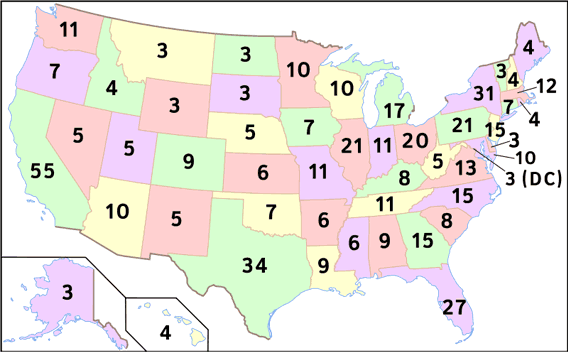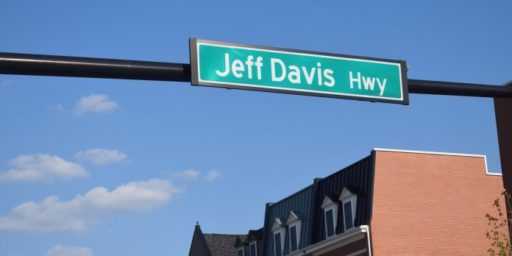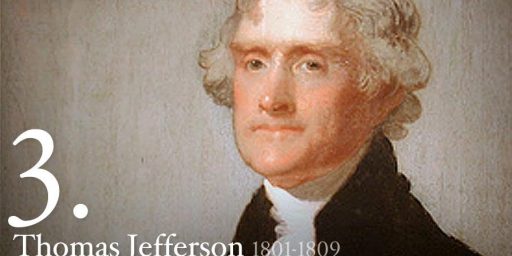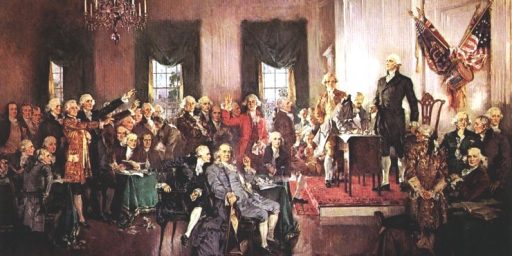Against the Electoral College II: Not As Framers Intended
In the first entry in this series we looked at a basic question of democratic theory. In this one, we look at whether the EC ever worked as the Framers intended.
 The second in an on-going series on the Electoral College.
The second in an on-going series on the Electoral College.
In my previous post on this topic I noted a fundamental argument against the Electoral College, i.e., the fact that it treats different citizens differently. Here I would like to address (at least in part) the notion that we ought to venerate the Electoral College fundamentally because it is a product of the Framers. After all, the basic argument tends to vested in the notion that the Framers were political geniuses who knew what they were doing and created a constitution that has functioned for two centuries plus making questioning its functioning a dubious proposition. More importantly, the basic logic goes, there were a host of good reasons behind the EC not dissimilar to the ones for the overall system of separation of powers, checks and balances, federalism, and so forth. So, again, preserving the institution is worthwhile, at least in no small part, because it is part of organic whole produced in Philadelphia in that heralded summer of 1787.
First, I will readily stipulate that many of the Framers were political geniuses (of the conventioneers, James Madison, Alexander Hamilton, and Benjamin Franklin readily leap to mind).
Second, I will further stipulate that there are a number of remarkable institutional innovations created in the US Constitution.
However, even stipulating to the above, we should note a key point about the Electoral College: it never functioned as the Framers intended. As such, arguments about the genius of its design are all vested in a misreading of history and misunderstanding of the institution.
Most people do not realize that the intended functioning of the EC was as follows:
- The selection method for choosing electors would be left to the states.
- Individual electors would have wide latitude in casting ballots.
- Each elector would cast two votes. The top vote-getter (if by a majority) would be president and the second place vote-getter (if there was no tie for second) would be Vice President (this can be found in the unamended text of Article II, Section 1).
- If no majority was achieved, the House would select the President (and ties for second, i.e., for Veep, would be dealt with in the Senate).
Under this system the following notions were assumed by the Framers:
1. Regional differences (and multiple electors per state) would lead to multiple candidates.
2. Multiple candidates would lead to a usual outcome of no candidate getting a majority of the electoral vote.
3. With no absolute majority winner (i.e., 50%+1, currently 270 EVs), the House would select the president from amongst the top five EV vote winners (later lowered to three by the XIIth Amendment), with each state’s House delegation having one vote and an absolute majority being needed for a winner.
The very notion, by the way, that they thought that there would be at least five serious competitors for the presidency underscores that they did not, in any way, foresee the current system as it actually functions. The fact that the number made its way into the original text makes clear indicates this lack of foresight on this topic. Such facts should help us remember that whatever the Framers were, they were not inerrant oracles.
4. In the case of a tie for Veep, The Senate would pick from the top two, and with each Senator having one vote.
(The above is all outlined in the US Constitution, Article II, Section 1 and was soon altered by the XIIth Amendment).
The Framers did not foresee either mass politics (a phenomenon that did not fully appear until Andrew Jackson) nor modern political parties (perhaps the greatest failing of their collective political genius). Instead, they very much expected a situation wherein once Washington was done being president, that the House would regularly choose the president from a list of candidates provided by the electoral college.
This scenario never materialized. As such, the notion that we should venerate the Electoral College because of the genius of design bequeathed by the Framers holds no water.
We can see the failings of the institution as designed in the elections of 1796 and that of 1800.
The first truly contested presidential election (i.e., one without Washington on the ballot), that of 1796 demonstrated that the vision of the Framers was flawed. Instead a slew of serious contender for the office, there appeared only four (and a handful of minor candidates): Adams, Jefferson, Pinckney, and Burr. While more serious contenders than our current politics would expect, it should also be noted that this was prior to the notion of a national ticket of President and Vice President. At the end of the day, Adams went on to win and Jefferson placed second, and therefore was Vice President.
The second contested election, that of 1800, further demonstrated that the EC didn’t work as well as envisioned. In that contest, Jefferson tied with Burr (ostensibly Jefferson’s running mate or, more accurately, the Republican choice for VP with Jefferson as the choice for President) and it took numerous ballots in the House (up and until the last minute), to break the tie and elect Jefferson as President. This led to the XIIth Amendment and separate votes for the President and Vice President within the EC. Again, this demonstrated that the EC did not function as the Framers envisioned, and instead required one of the first true amendments to the Constitution (i.e., only the second after the Bill of Rights).
Many commenters about the Electoral College appear (sometimes quite overtly) to base their defense of the institution in the intention of the Framers. However, to make such an argument is to ignore the simple fact that institution never functioned as intended in the first place.
One has to remember that the EC was part of broad compromise needed at the time to get small states to surrender the power they had under the Article of Confederation. It was far more about political exigencies than it was about well designed political institutions. Indeed, if one reads the notes on the debate from the convention, one finds that the EC was a late entry in the discussion and was nowhere near as completely debated as, say, the structure and function of Congress. Indeed, during much of the convention, the working framework was for the president to be chosen by the legislature (the exact iteration varied). It was not until early September of 1787 that the EC process was adopted (the convention ran from May 14-September 17). The basic language that would make into the original text of Article II was adopted on September 6, 1787 (see Madison 1987:593-594).
Really, the EC as we understand emerges through a process of political evolution. It was not birthed full grown by the Framers.
The real bottom line is this in regards to this aspect of the topic: most of us (once, myself included) who seek to defend the Electoral College do so from the perspective that they sincerely believe that they are defending the US Constitution and specifically a well-designed institutions crafted by the Framers of the that Constitution to deal with uniquely important American political eccentricities. However, such arguments are problematic for the basic reason directly outline above: the EC as we currently have it was not the institution that the Framers thought they were designing in the summer of 1787. Indeed, of the institutions created by the Constitution, it is probably the one the Framers would least recognize in its contemporary manifestation.
And yes, there were political exigencies of the day that made the EC part of broad set of compromises at the time. Those conditions, shaped primarily around the need to get small states to abandon the confederation not longer exist.
As such, if one wishes the argue for the Electoral College one has to find a basis for argumentation that is neither vested in the intent of the Framers nor in anachronistic comparisons between large and small states now versus then.
For Further Reading
I would highly recommend John Ferling’s Adams v. Jefferson: The Tumultuous Election of 1800 for the best treatment of early presidential elections that I have read.
Also of interest:
Adkison, Danny M. and Christopher Elliott. 1997. “The Electoral College: A Misunderstood Institution.” PS: Political Science and Politics, 30,1 (March): 77-80.
Madison, James. 1987. Notes on the Debates in the Federal Convention of 1787.
Rossiter, Clinton. 1966. 1787: The Grand Convention.






It’s not that the framers didn’t foresee the effects of political parties, it’s that they didn’t foresee the dominance of two national parties. The very idea that Maine, Florida and California would share the same policies would have seemed ridiculous. The belief seemed to be that parties would be more numerous, and thus realistic candidates more numerous. Indeed, coalition governments are a necessity is a great number of countries because of this.
Michael
They saw the effect of factional behavior, yes. They did not, however, foresee that modern political party system as we understand it (even as it was emerging around them)–certainly not as an organizing institution within democratic governance.
Update: I left a crucial “not” out of the original comment and have added it (as well as the word “system”).
Put another way: the role of parties is fundamental to our understanding of legislative behavior now that we have seen (for some time now) democratic legislatures at work. The Founders, including Madison, did not fully foresee this, but instead expected only temporary alliances to emerge around given issues only to dissolve once the issue was dealt with (this is the crux of his argument in Fed 10).
I’m not that well versed in English political history, but was the “shifting alliances” paradigm current — an actual fact — when the Framers did the framing?
An fact of English parliamentary practice, I should have written.
Not in the way Madison sketched it out in Fed 10 and elsewhere, no.